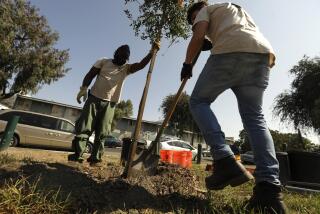List of Ailments and a Remedy on Caring for Children
- Share via
Los Angeles is one of the worst places to raise a child, ranking near the bottom of U.S. cities in quality of education, environmental safeguards and economic well-being provided to children, according to a study released Tuesday by Zero Population Growth.
The survey rated 219 cities of 100,000 or more on factors such as teenage pregnancies, dropout rates, student-to-teacher ratio, air quality and child poverty in an attempt to quantify the quality of life of millions of children nationwide.
Called the Children’s Environmental Index, the survey ranked Los Angeles 201st overall--and among Southern California cities, only San Bernardino (214th) and El Monte (204th) fared worse.
By contrast, the California cities of Irvine, Thousand Oaks and Simi Valley ranked in the top 20, while Naperville, Ill. ranked No. 1.
At a news conference in front of the downtown Los Angeles Children’s Museum, authors of the study said their intent is not to knock big cities like Los Angeles and others that fared poorly, but to prod civic leaders to improve standards.
“This study is done in defense of big cities like Los Angeles,” said the group’s executive director, Peter H. Kostmayer, a former Pennsylvania congressman.”It’s a wake-up call to everyone in America.”
Zero Population Growth is a Washington-based nonprofit group that advocates slowing population increases worldwide.
But the accuracy, methodology and value of the organization’s survey were called into question by some social policy experts. Dowell Myers, a professor of urban planning at USC, called the survey and its conclusions “indiscriminate, imprecise and riddled with holes.”
For example, he said, the survey uses dropout rates, median family income, childhood poverty rates and teenage birth rates that are several years old.
Meyers said the study also “left out a lot of other things that are important, like the availability of sports activities, youth development programs, music instruction in schools. . . . I agree wholeheartedly that child poverty and teenage pregnancy are problems, but those things are not quality-of-life issues.”
Other Los Angeles civic leaders were equally unpersuaded.
“It’s dangerous to focus on one dimension. There is a full spectrum of activities people need to focus on,” said Noelia Rodriguez, spokeswoman for Los Angeles Mayor Richard Riordan.
She said the mayor has made the welfare of children a special cause, going so far as to create a city commission on Children, Youth and Families.
According to the study, Los Angeles is not alone among the nation’s largest and best-known cities in providing a poor environment for children: Detroit, Baltimore, St. Louis, New Orleans, Miami and Chicago ranked among the bottom 20 cities.
(BEGIN TEXT OF INFOBOX / INFOGRAPHIC)
Kid-Friendly Cities
Here are results of a nationwide ranking of communities of 100,000 or more based on “kid-friendly” factors such as teenage pregnancy rates, school dropout rates and infant mortality.
Top 5 communities in nation and their ranking:
Naperville, Ill.: 1
Overland Park, Kan.: 2
Irvine, Calif.: 3
Plano, Texas: 4
Fargo, N.D.: 5
Los Angeles County communities and their ranking:
El Monte: 204
Glendale: 117
Inglewood: 189
Lancaster: 151
Long Beach: 171
Los Angeles: 201
Norwalk: 140
Palmdale: 143
Pasadena: 166
Pomona: 185
Santa Clarita: 49
Torrance: 61
West Covina: 108
SOURCE: “Children’s Environmental Index,” Zero Population Growth
More to Read
Sign up for Essential California
The most important California stories and recommendations in your inbox every morning.
You may occasionally receive promotional content from the Los Angeles Times.











